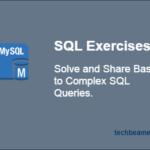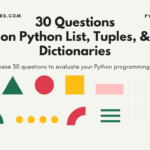While writing SQL queries, the WHERE keyword plays an important role. It not only gives you precise results but also saves your database server from extra processing.
SQL WHERE Clause Explained with Examples
By using the WHERE clause, you can write extraordinary SQL queries. This tutorial tries to explain everything you can do with it and can easily have a good grasp of using it.
Introduction to SQL Where Clause
In the world of databases, precision matters. The WHERE clause in SQL acts as your guide, helping you filter data based on specific conditions. This tutorial focuses on SELECT, UPDATE, DELETE, and INSERT INTO statements, showing you how to use the WHERE clause effectively.
Syntax Overview
Let’s start with the basics. The WHERE clause’s syntax is straightforward:
SELECT column1, column2, ...
FROM table
WHERE condition;Simple Examples
Now, let’s dive into practical examples. Suppose you want to select employees with a salary exceeding 50000:
SELECT *
FROM employees
WHERE salary > 50000;Or perhaps update user statuses to ‘inactive’ based on their last login date:
UPDATE users
SET status = 'inactive'
WHERE last_login < NOW() - INTERVAL 6 MONTH;Deleting products with zero stock quantity is as simple as:
DELETE FROM products
WHERE stock_quantity = 0;How to Use Where in SQL Queries
Now, get your hands on some real-time examples where you will be building SQL queries using the where keyword.
Combining Conditions
Let’s explore combining conditions. Maybe you’re interested in electronics with a price tag over 500:
SELECT *
FROM products
WHERE category = 'Electronics' AND price > 500;You can also select active users or those who logged in within the last 30 days:
SELECT *
FROM users
WHERE status = 'active' OR last_login > NOW() - INTERVAL 30 DAY;Using Wildcards
Using wildcards adds versatility. For instance, choose products whose names start with ‘Smart’:
SELECT *
FROM products
WHERE product_name LIKE 'Smart%';Or find usernames with ‘a’ in the third position:
SELECT *
FROM users
WHERE username LIKE '__a%';Using Where with Different Databases
Is it the same as using the where clause with different databases? The answer is both ‘Yes’ and ‘No’. Just check out, we’ll though not go into much detail here.
MySQL
MySQL introduces its quirks. Suppose you want records after a specific date:
SELECT *
FROM orders
WHERE order_date > '2023-01-01 00:00:00';Utilizing the BETWEEN operator in MySQL for a range:
SELECT *
FROM sales
WHERE amount BETWEEN 100 AND 500;SQL Server
Shifting gears to SQL Server, selecting records where the total amount is not null:
SELECT *
FROM invoices
WHERE total_amount IS NOT NULL;Choosing the top 10 records in SQL Server is as simple as:
SELECT TOP 10 *
FROM customers;MongoDB
MongoDB, a NoSQL player, employs a different approach. Finding shipped orders:
db.orders.find({ status: 'shipped' });Querying nested documents, like employees in the IT department:
db.employees.find({ "department.name": "IT" });Performance Tips to Use Where in SQL Queries
Now, find out some tips, or let’s call them best practices that you should follow to write efficient queries.
Indexing
Optimizing performance involves indexing. For example, create an index on product codes in MySQL:
CREATE INDEX idx_product_code ON products (product_code);Or create a non-clustered index on customer IDs in SQL Server:
CREATE INDEX idx_customer_id ON orders (customer_id);Avoiding Functions in WHERE Clause
Function usage impacts performance. Instead of applying functions directly, consider this example:
SELECT *
FROM sales
WHERE YEAR(order_date) = 2023;A more efficient alternative:
SELECT *
FROM sales
WHERE order_date >= '2023-01-01' AND order_date < '2024-01-01';Certainly! Let’s add a section with relevant FAQs (Frequently Asked Questions) about the WHERE clause in SQL.
While Clause – Frequently Asked Questions (FAQs)
Now, take on some common questions around the where clause in SQL. These will help you get more knowledge about this topic.
Q1: What is the purpose of the WHERE clause in SQL?
A1: The WHERE clause filters records based on specified conditions in SQL queries. It allows you to retrieve, update, delete, or insert data selectively, enhancing the precision of your operations.
Q2: Can I use multiple conditions in the WHERE clause?
A2: Yes, you can use logical operators such as AND, OR, and NOT to combine multiple conditions in the WHERE clause. This flexibility enables you to create complex filtering criteria.
Q3: Are wildcards only used with text fields in the WHERE clause?
A3: While wildcards like % and _ are commonly used with text fields for pattern matching, they can also be applied to numeric or date fields, depending on the desired query.
Q4: How does indexing impact WHERE clause performance?
A4: Indexing enhances performance by creating a data structure that allows the database engine to quickly locate rows that satisfy the WHERE clause conditions. It’s especially useful for columns frequently used in conditions.
Q5: Is there a difference in syntax for the WHERE clause across different SQL database systems?
A5: The basic syntax remains consistent across most SQL database systems, but there might be subtle differences in advanced features or specific functions. It’s recommended to refer to the documentation of the specific database system you’re using.
Q6: Can I use the WHERE clause with non-relational databases like MongoDB?
A6: Yes, in MongoDB, the equivalent of the WHERE clause is the query document provided to the find method. It allows you to filter documents based on specific criteria.
Q7: Are functions advisable in the WHERE clause for optimal performance?
A7: Using functions in the WHERE clause can impact performance negatively. It’s generally recommended to avoid applying functions directly to columns in the WHERE clause, as it may prevent the use of indexes.
Q8: Can I combine different types of conditions in a single WHERE clause?
A8: Yes, you can mix conditions involving numeric, text, or date fields within a single WHERE clause. The key is to ensure that the logic is sound and meets the requirements of your query.
These FAQs aim to address common queries about the WHERE clause in SQL, providing insights into its usage, optimization, and compatibility across different database systems.
Conclusion – Using Where in SQL Queries
In conclusion, mastering the WHERE clause opens a world of possibilities in SQL. Whether you’re handling MySQL, SQL Server, or MongoDB, these insights will empower you to write efficient queries. Navigate your databases with confidence, leveraging the WHERE clause for precision in data manipulation.
Top SQL Queries Asked in Interviews
Check out the 50 most-asked SQL query interview questions.
We need your support to run this blog, so share this post on your social media accounts like Facebook / Twitter. This is how you will encourage us to come up with more informative stuff.









